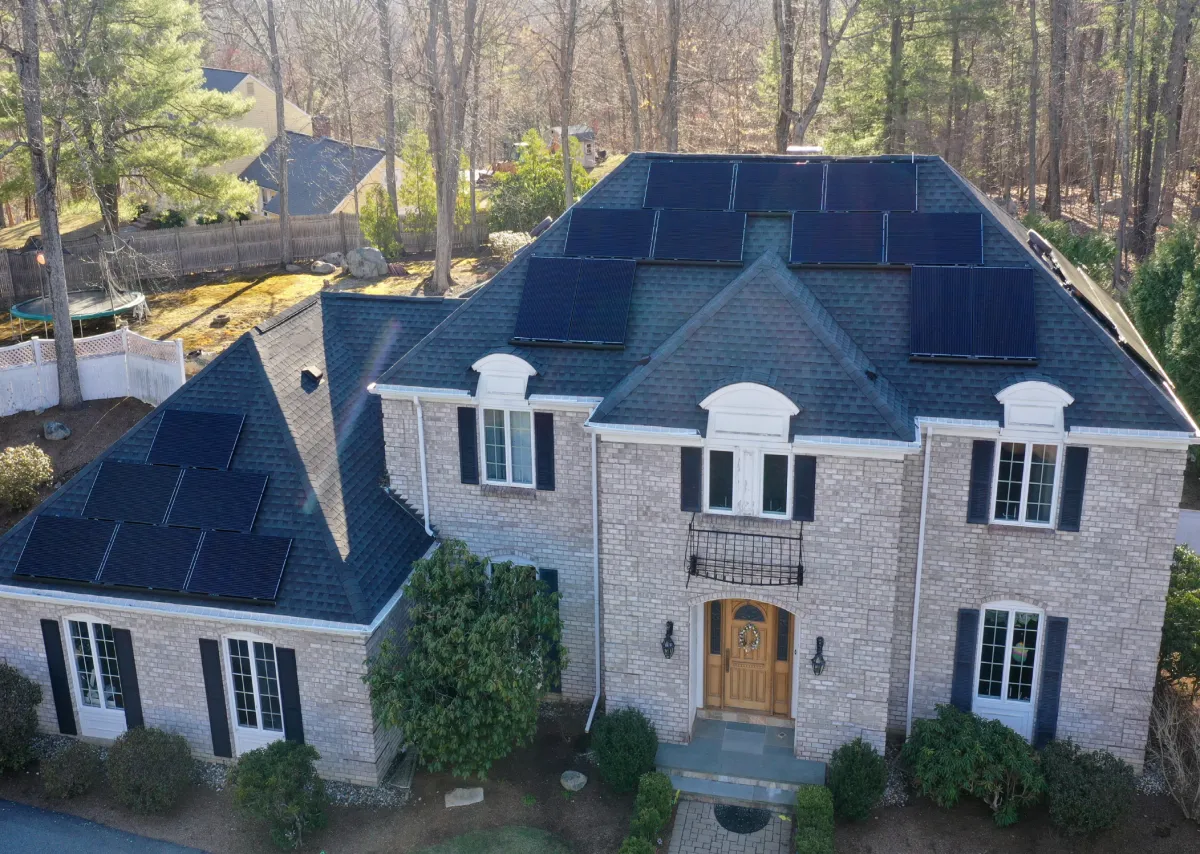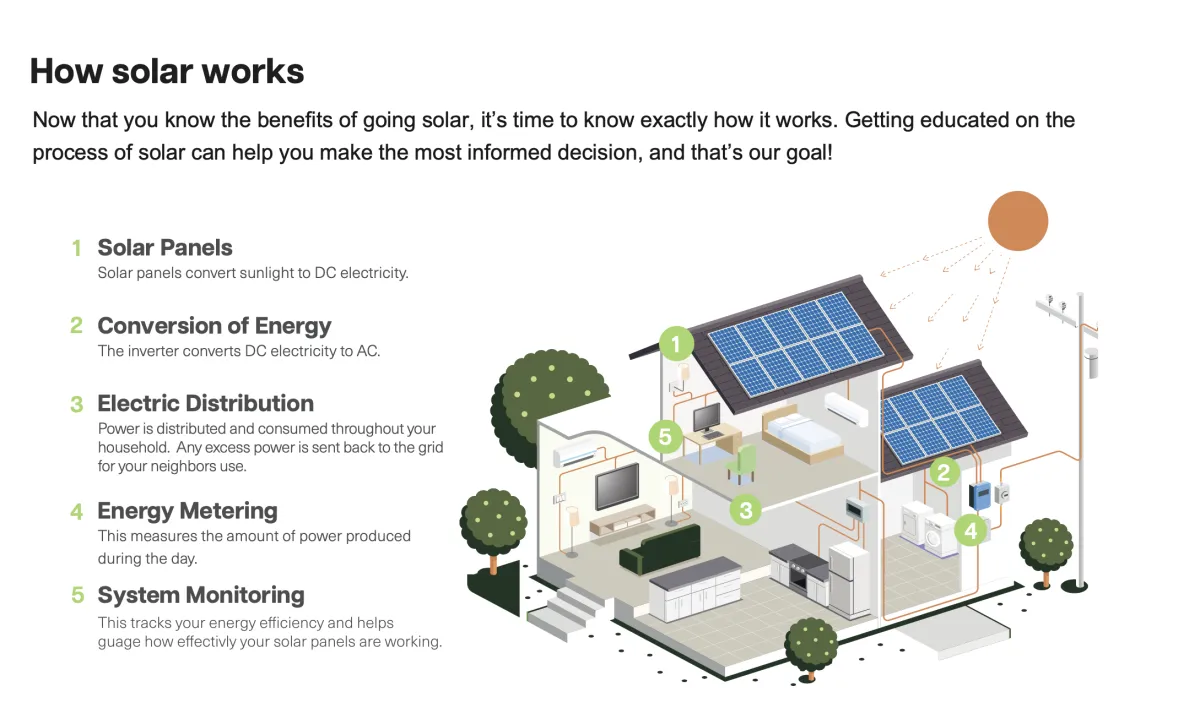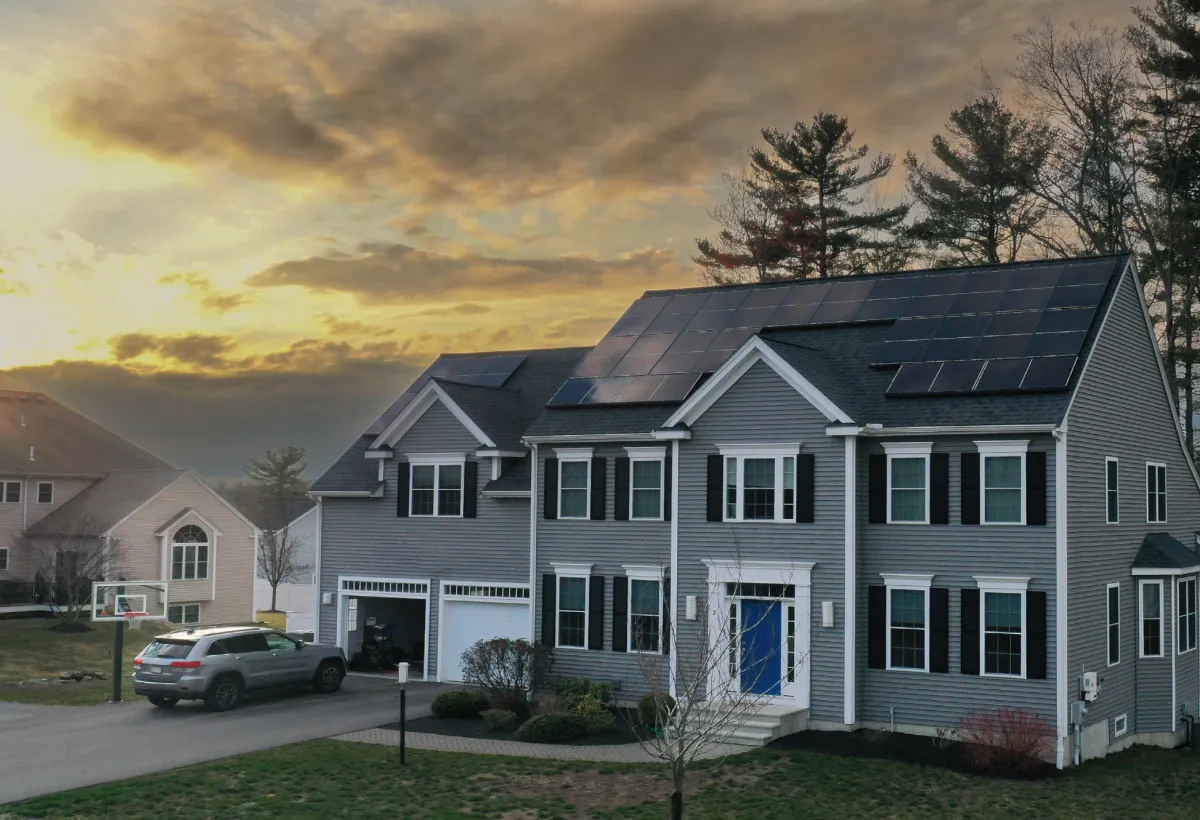

Going solar is one of the best investments a homeowner can make in their home because a solar power system can cover most if not all of your utility bill each month. With the ability to lock in your monthly payment, solar also provides peace of mind so you don’t have to worry about unpredictable energy payments. We are a company that focuses on integrity, quality and transparency. It is important to us that you have all the information you need to make the best solar decision for you and your family. Here is your complete guide to going solar!
Why people go solar?
There are several reasons to go solar but the main reasons are the potential savings, what it can do to the home’s value and of course, the environmental benefit.
Potential savings
The main reason people go solar is so they can save money on utility bills. How much you can save depends on how much electricity your household uses. The more power you use, the more money you will save by going solar. For example, a typical household uses about 7,000 kWh per year, and pays about $1,500 per year. By going solar, an average household could save $1,307.52 per year, or $37,500 over the 25 year production guarantee period that solar power systems typically have. If that same household uses a lot of electricity, say 12,000 kWh per year, that household would save about $48,000 over a 25 year timespan.
Possibly add value to your home
There are several ways solar can increase the value of your home. If you own solar, your home can become very enticing for a new buyer. This tells them that they can start benefiting from solar immediately without having to wait on the installation process. This can cause your home to sell faster and at a higher price. More predictable utility rates: When your installation company builds your custom solar system, they create it based on your specific energy needs. This means your monthly bill will reflect your average energy use. This makes your monthly energy bill more consistent. Imagine the peace of mind you’ll gain by being able to properly budget around a more predictable energy bill.
Tax Credits and Incentives for Going Solar
Solar systems installed between 2022-2032 are eligible for a 30% tax credit thanks to the extension of the Investment Tax Credit (ITC). However, this is a limited-time offer. The tax credit will decrease to 26% for systems installed in 2033 and 22% in 2034. The tax credit will expire in 2035 unless Congress renews it. Some states offer incentives for going solar. The best way to find out what incentives are available, and which ones you qualify for is to talk to a solar power dealer.
Why people go solar?
You should contact a qualified tax expert and consult with them. Neither Distinct Exteriors nor Distinct Exteriors Sales Representatives can give you tax advice. A qualified tax professional will understand your situation and be able to give you the most relevant advice.
Better for the environment
Most of the time, people go solar for financial reasons. But they are still helping to save the environment. Solar panels make up for the amount of carbon used to produce them in about 2 years. For the remaining decades of service life left in them, they reduce the amount of carbon produced to make electricity.

How do solar panels work?
A solar panel is made up of many photovoltaic solar cells connected together. Each of those cells works by allowing photons (energy from the sun) to knock loose electrons from atoms in the cells. Those electrons then flow through attached wires in the form of electricity. The more solar cells you have in a solar panel, the more electricity it can generate. The electricity generated by solar panels is direct current. To use it to power a home or the electrical grid, the direct current must be converted to alternating current. That conversion is done by a component called an inverter.
Net metering
Since your system is most likely attached to the grid, you could potentially take advantage of net metering. Net metering happens when you use less energy that what your system produces. What happens to the left over energy? If the power is sent to the grid, then the house’s electrical meter spins backwards. If the meter spins far enough backwards to show a negative amount of power consumed per month, then the customer gets a bill credit at the end of the month. Some utility companies will even write a check for left over bill credits.
Storage Systems (A.K.A. energy storage systems)
Are normally used as a temporary back-up source of power. For example, batteries can provide emergency energy to customers in coastal climates that experience regular outages. Batteries can also be configured to discharge when the solar system is not producing and during peak consumption or peak utility rate hours.
What it takes to go off-grid with solar:
You would need both a solar panel system, and enough batteries to power your home when the sun isn’t shining. Off-grid solar is very expensive because of the batteries. That is why most people who install batteries remain connected to the grid. They only use the batteries to power their home during peak rate times, which are usually in the evening, after the sun has set.
What to know before going solar
We think everyone could benefit from solar. To get the most out of going solar, here is some useful information to know beforehand.
Your roof type
The type of material used to roof your house matters. We can install on most roof types. Depending on the roof type, the installation process may differ slightly. No matter what type of roof you have you will benefit from a 10-year penetration warranty. Roof types that solar is commonly installed on include:
Asphalt Shingles, Metal Roofs, Also Commercial Roofing Materials such as Epdm, Metal Panel, Poly-Iso and Tar n Gravel Asphalt and Metal shingles are among the best roofing materials for going solar because they are the most durable type of roofing materials. This also makes them easier to install solar on than other roof types. If your roof type isn’t listed above, don’t panic! Solar can be installed on nearly every type of roof. A solar power installation company such as Distinct Exteriors can advise you about what roofing or work maybe required to mount solar panels on your roof.
Roof condition
Solar panels can be costly to remove once they are installed. For that reason, you should look at the condition of your roof when choosing to go solar. If your roof needs repairs due to roof leaks or structural problems, make those repairs prior to installing solar panels. If you aren’t sure about the condition of your roof, then Just Ask your Distinct Exteriors Sales Representative to arrange for a on site inspection for you. Problems with your roof can also be fixed during the solar installation process.
How much sunlight your property gets:
It is very important that your property is exposed to enough sunlight. If your property is surrounded by tall trees or other obstructions to sunlight, we will let you know what your options are. We may also recommend mounting your system on the ground or recommend other ways to get your property ready for solar. Just remember, the more sunlight your property gets, the better.
• Composite Shingle
– made of a mixture of several commonly used roofing materials such as fiberglass, recycled paper products and asphalt.
Metal
– Panels or Shingle
Torch-Down
– Often low angle or flat roofs
EPDM
– 60Mil Rubber
All Commercial roof types
If your roof needs repairs, Make those repairs prior to installing panels.
Preserve The Environment For Future Generations.
Imagine having the electric company pay you, instead of you paying them.
Know your financial options
The good news about solar is financing options are becoming more and more flexible. This is allowing more and more people to start benefiting from solar even if their credit isn’t the best. Find out what finance options best suit you!
Solar purchase vs. loans Purchase:
The decision to buy depends on your finances. If you have good credit, you’ll get the greatest return on investment from your solar power system by buying it. Even after loan costs are figured in, purchasing gives you the best bang for your buck when going solar. Some finance companies offer more aggressive financing than others, so shop around. Distinct Exteriors may be able to find financing even with a FICO score as low as 600. PACE loans are another option where available. Property Assessed Clean Energy Loans (PACE) finance your solar with a property tax assessment on your home.
Zero down financing options for solar:
If you decide to purchase your system, there may be several zero-down financing options available to you. You can get a secured or unsecured loan at a bank or other lender. Many solar power companies including Distinct Exteriors have third-party financial partners that can finance your solar system. You may also be able to find financing in your local community in the form of a PACE loan. PACE loans finance your system with a small tax assessment on your home.
Secured vs unsecured loans:
f you decide to take out a zero-down loan to buy your system, you’ll need to choose between secured and unsecured loans. Each has its advantages and disadvantages. Both types of financing make you eligible as a system owner for any Federal and state tax deductions and other incentives that are available.
Secured loans:
Secured loans use your home or some other asset as collateral. If you fail to make your payments, the bank seizes the asset that you secured your loan with. Secured loans represent less of a risk to the bank than unsecured loans, so they often come with lower interest rates and are easier to qualify for. To qualify for a secured loan, you must have enough equity in your home (or some other asset) to cover the cost of the loan. The interest on secured loans is often tax deductible.
Differences between secured and unsecured loans
Secured loans
.Require collateral
.No origination fees Interest
."may" be tax deductible
.Usually have lower interest rates
.Easier to qualify for
Unsecured loans
.Don’t require collateral
.Interest isn’t tax deductible Usually have higher
.Interest rates Harder to qualify for
No statement contained herein shall constitute tax or legal advice. You should consult a legal or tax professional on any such matters.
How the installation process works
There is more to going solar than just building a solar system on your roof and flicking a switch to turn it on. The installation company must get the necessary permits from your local jurisdiction. Then they have to design and build your system. Once the system is built, then your local utility company needs to come out to your home and inspect it. If the system passes inspection, the last step is for the utility to grant Permission-to-Operate (PTO).
Assessing your energy needs:
Your solar journey begins with an assessment of your solar needs. Your Distinct Exteriors solar power sales representative comes to your home and analyzes your utility bill. Using that information, the sales rep determines how much power you need to produce to offset your electrical consumption.
Plans & Permits:
At this point, we’re working hard behind the scenes to get your home ready for installation. During this time, if it hasn’t already happened, a certified site surveyor will be coming to your home to gather photos, videos, and measurements. These assets will go to our Engineers and Designers so they can create your solar system plans. From there, we’ll send these plans to your city approval department to receive your solar permit. This process can take up to 6 weeks to complete. After that, it’s time for your installation day!
Installation:
The big day has finally arrived! Your solar installer arrives to install your new solar system. Most installations only take a day or two. Your solar installer will also make any upgrades needed to prepare your home for solar. Those upgrades can include fixing breaker wiring in your circuit breaker box and making minor repairs to your roof. If your roof needs more than minor repairs, Distinct Exteriors will make them before the solar system is installed.
Inspection:
After the system is installed, your local utility company will need to come out and inspect it before allowing it to be connected to the grid. Demand for inspections is high which is why this stage may be lengthy. Multiple inspections may be required, depending on your local municipality’s requirements. We’ll work with them to set up the most convenient inspection possible for you.
Permission to Operate:
After your system passes inspection, your solar installer will ask the utility company for Permission to Operate (PTO). This is the final step in the installation process. Once PTO is granted, your solar installer will remotely switch your system on. At that point, your system begins delivering electricity to the grid and potential savings to your bank account!
Why go solar with Distinct Exteriors
Not all solar installers are cut from the same cloth. As one of the fastest-growing solar companies in the nation, we stand out from the pack with our commitment to quality, unparalleled customer service and our 25-year production guarantee.
Our 25-year production guarantee
Our 25-Year Production Guarantee ensures that if a system we installed ever breaks or under-produces due to Your Solar installers fault, we will fix or replace the broken components. In some cases, we will reimburse customers for their finance payments. If the system has not met its annual production guarantee then we will either reimburse for loss in production or add additional modules to produce enough to meet the production guarantee. If something goes wrong, we are usually the first to find out. We will get in contact with our customer to schedule a time for an on site repair. We want to get you back to solar as soon as possible. 25-year production guarantee – on TOP of your system’s standard warranty! If your system produces less power than we say it will, you can get a check for the difference covered under our 25-year production guarantee. That’s more power in your hands. When we say “freedom from high utility bills” we mean it!
“We guarantee that your solar power system will meet its promised production amount for 25 years.”

Frequently asked questions
Do I still get a utility bill after I go solar?
Yes, but your utility bill will be a lot smaller, or maybe even a bill credit if you generate more power than you use. If you have left-over bill credits at the end of the year, you’ll get a check for the amount of those credits. Solar power systems are designed to net-meter out. That means they are designed to produce as much power as the home uses, so the homeowner doesn’t end up paying for electricity. You will still be responsible for any non-bypassable charges your utility company adds to your bill. A non-bypassable charge is a fee that the utility company adds to your bill. Those fees are often used for grid maintenance and infrastructure upgrades.
Do solar panels work in a blackout?
For most grid-tied solar power systems, the answer is no. The system is connected to the grid, not your home. In the event of a blackout, the solar power system has a special cut-off to prevent electricity from being sent into damaged electrical grid wiring. It’s a safety feature that protects line workers that are working to restore the power.
What kind of maintenance do solar panels need?
Solar panels need very little maintenance. If they get dusty, sweep or squeegee it off. If they get covered by snow, sweep it off or wait for it to fall off on its own. That’s it! No further maintenance required.
How do I maximize my savings on my solar power?
It’s easy! Just use less power than your solar panels produce. If you live in an area with Time-of-Use billing, be sure to minimize your use of electricity during peak rate hours. Those are usually in the evening. You can also make upgrades to your home to include electric heat pumps, electric heaters, etc to ensure you are using only the power you produce. In some cases, we can add additional systems if roof space allows.
What happens when there is snow on solar panels?
Snow will prevent sunlight from reaching the panels, so they won’t generate power when covered with snow. Most solar panels are mounted at an angle, so snow will eventually slide off of them. If you don’t want to wait for the snow to fall off, you can brush the snow off with a push broom.
How long does a solar power system last?
Most solar systems including those built by Distinct Exteriors are warrantied to last for 25 years. It’s very likely that your system will last longer than that. There are 40 year old solar systems out there that are still going strong, producing about 75 - 80% of the power they were originally designed to produce. As they age, solar panels lose about 0.5 - 1% of their power output per year. Thus it’s very likely that your solar system will outlast its warranty.
Make money producing your own power
Imagine having the electric company pay you, instead of you paying them. That can happen when you install a solar power system. When you use less energy than what your system produces, you could get a bill credit from your utility company.
Increase the value of your home
Installing solar power can give you a greater return on investment than most home renovations. According to PV Magazine, home solar is a better investment than granite counter tops. Solar panels may return up to 97% of your investment where granite counter tops only return up to 60% of their cost. The average homeowner sees an increase of about $15,000 to the value of their home. If you decide to sell your home one day, a solar-powered house can attract more buyers who know the benefits.
Our Partnership
Distinct Exteriors Solar is dedicated to making sure you receive a 5-star level of service when choosing to go solar. We do this by partnering with solar experts that work to give you the best deal possible. What makes this partnership so effective is that you have specialists coming together to give you the best service possible. The solar expert goes over the different solar options with you, helps you gain access to some of the most flexible financing options, then get you connected with one of the top solar installers in the nation, Distinct Exteriors. Once a contract has been signed, Distinct Exteriors goes to work to help make sure you have the smoothest, fastest and highest quality installation. That’s what we specialize in. When our teams come together we are able to support you on your solar journey.
Why Choose Distinct Exteriors
Distinct Exteriors is one of America’s fastest-growing solar installation companies. Our success comes from an unparalleled track record of service, transparency and accountability towards our customers.
Easy Financing
Distinct Exteriors has teamed up with some of the top finance partners to provide flexible options, even for customers with FICO scores as low as 600. We partner with some of the nation’s leading solar system finance companies to offer our customers some of the lowest rates in the industry. Going solar shouldn’t feel impossible. We focus on flexibility so you can stress less and start your solar journey.
Our 25 Year Production Guarantee
Distinct Exteriors makes sure you’re protected from the unexpected with our unique 25-year production guarantee. We guarantee our system will produce the amount of power we say it will for 25 years. So, if it ever under-performs, or stops working, we’ll fix it and reimburse you for any lost energy at one of the highest retail price rates.* This means you can go solar with confidence.
* Subject to the terms and conditions of your agreement.
Ready to start benefiting from Solar?
With Distinct Exteriors you’re one step closer to a more predictable energy bill. Let us help you on your journey toward saving for the things that matter!
Make a positive impact on the environment
The average solar home prevents 300 tons of pollution from getting into our breathable air. So, in a span of 50 years, that is the equivalent of saving a 300-acre forest. Just by going solar, you are doing your part to help preserve the environment. Now imagine the positive impact it would have if all of your neighbors decided to go solar, too! The future is looking pretty bright!
5-Star Service
We always strive to deliver 5-star level service. This allows us to create positive experiences all across the nation. We’re able to provide peace-of-mind through:
Customer Portal
One thing our customers usually comment on is our communication. That’s no accident. We developed an advanced customer portal that makes sure you’re always notified each step of the installation process. Whether you’re on our website or our mobile app, with Distinct Exteriors, you’re never left in the dark.
Monitoring
To give you further peace of mind, your system is monitored for 25 years. That way, if your system ever under- produces, we will let you know right away and take the necessary steps to get the issue resolved.
Guarantee
We work hard to make sure our guarantee is one of the best in the business. We’ve never been much for fluff, so we created a guarantee to truly benefit the homeowner. If your system ever under produces, you can relax and know that you are protected from having to pay for the same energy twice.
Area: Janesville & Rock County, WI
Call 608-208-6088
Email: [email protected]
Site: janesvilleroofer.com
